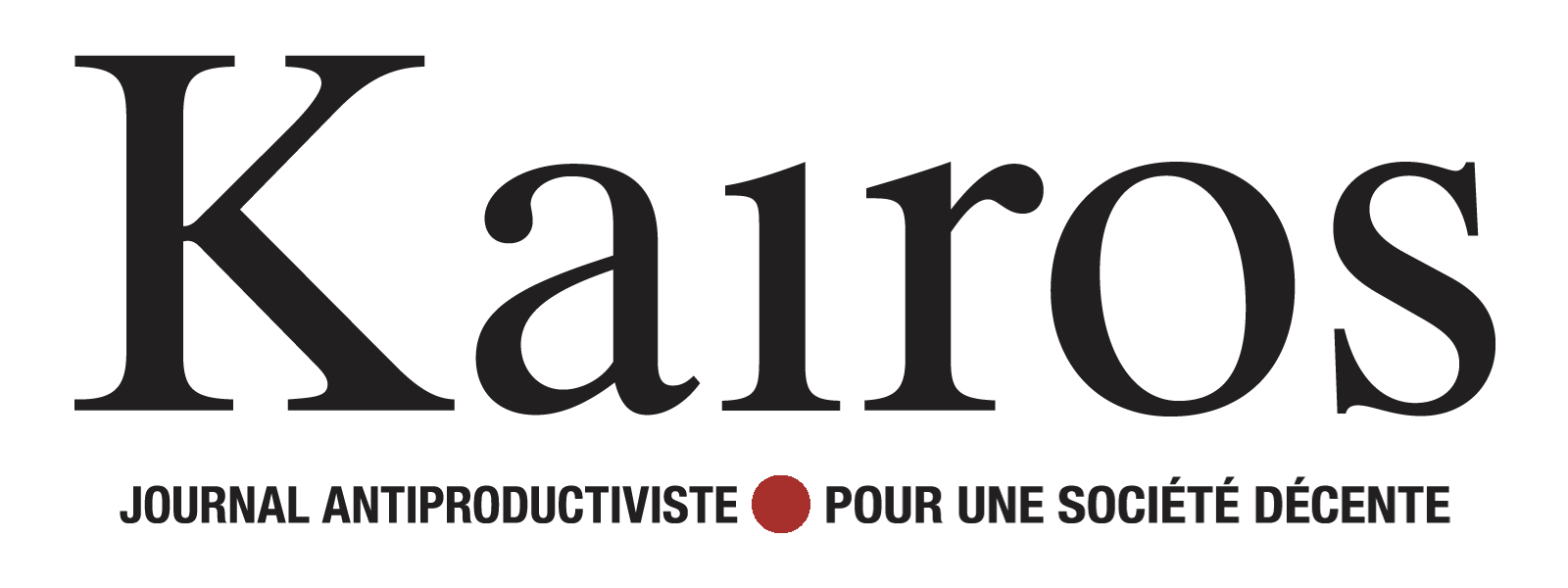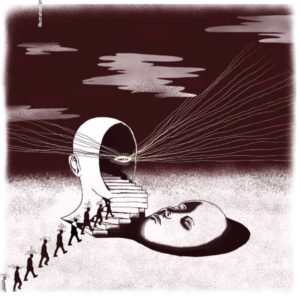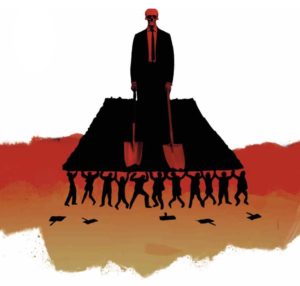Alors que la Russie et L’Ukraine sont les principaux exportateurs de céréales au monde, le conflit dans le Donbass a précipité la fin d’un accord céréalier signé entre les deux pays, la Turquie et les Nations unies afin de maintenir les exportations, aggravant la crise alimentaire touchant déjà des millions de personnes dans le monde. A nouveau, on découvre comment la guerre détruit tout, au-delà des frontières des belligérants.
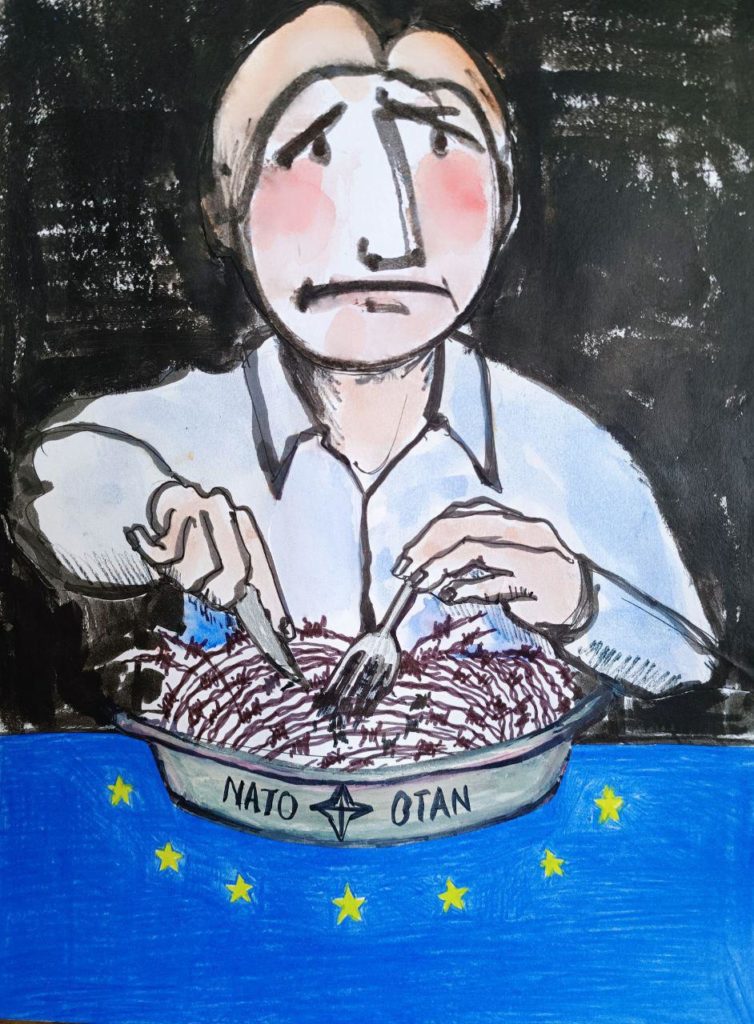
Le 17 juillet dernier, la Russie a annoncé la suspension de sa participation à l’initiative céréalière de la mer Noire. Celle-ci avait été mise en place pour conjurer le risque de voir s’amplifier la crise alimentaire, en ramenant les produits russes et ukrainiens sur le marché mondial. Avant le conflit dans le Donbass, la Russie et l’Ukraine étaient parmi les principaux exportateurs de céréales au monde, fournissant un tiers du marché mondial du blé. Cependant, suite au déclenchement du conflit en Ukraine, de nombreux pays ont pris la décision de suspendre le commerce avec la Russie, tandis que les exportations de céréales ukrainiennes ont dû cesser en raison des hostilités. Cette situation a intensifié la crise alimentaire qui touche près de 200 millions de personnes dans 53 pays, selon la FAO.
Pour résoudre cette crise, une solution diplomatique a été trouvée sous forme d’un accord sur les céréales signé à Istanbul le 22 juillet 2022 par la Russie, l’Ukraine, la Turquie et les Nations unies. Cet accord se compose de deux volets: la création de corridors maritimes sécurisés pour les exportations de céréales à partir de trois ports ukrainiens, ainsi qu’une aide à l’exportation de produits agricoles et d’engrais russes vers les marchés mondiaux. Cependant, les engagements pris vis-à-vis de la Russie n’ont jamais été respectés, ce qui a conduit à la décision de Moscou de se retirer provisoirement de l’initiative céréalière.
En septembre 2022, le président russe Vladimir Poutine a critiqué l’UE pour avoir refusé d’envoyer des engrais russes aux pays les plus pauvres d’Afrique et d’Amérique latine, qualifiant cela de « fraude totale ».
En octobre 2022, le FSB a conclu que les explosifs utilisés pour faire sauter le pont de Crimée avaient été livrés par voie maritime via le corridor de la mer Noire. Le 29 octobre 2022, la Russie a annoncé son retrait de l’accord sur les céréales, mais est finalement revenue dans l’accord après avoir reçu des garanties que le corridor humanitaire ne serait utilisé qu’à des fins humanitaires.
Lors d’une interview du 13 juillet 2023, Vladimir Poutine a exprimé son mécontentement quant à l’application de l’accord sur les céréales de la mer Noire, affirmant que la Russie n’avait rien obtenu de cette initiative. Il a même évoqué la suspension de l’accord si les termes n’étaient pas respectés. C’est cette hypothèse qui s’est matérialisée le jour de l’arrivée à échéance de l’accord. Malgré cela, la Russie a laissé la porte ouverte à une éventuelle réintégration dans l’accord si ses demandes étaient satisfaites. Toutefois, pour forcer la Russie à rester dans l’accord, une attaque de drones a été lancée contre la ville de Sébastopol et le pont de Crimée, faisant des victimes.
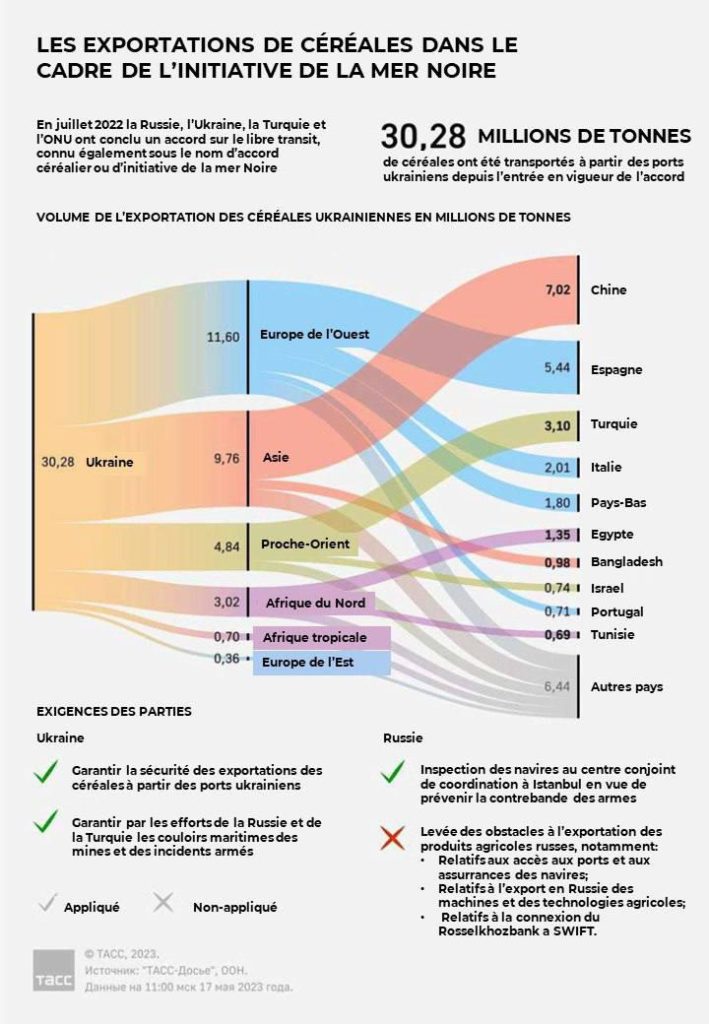
L’avenir de l’accord sur les céréales est incertain depuis que la Russie s’est retirée. L’Ukraine a suggéré à la Turquie de poursuivre sans la Russie, mais la Turquie a informé le gouvernement ukrainien qu’elle ne fournirait pas d’escorte ni de protection aux navires commerciaux tentant d’exporter des céréales à partir des ports de la mer Noire, en raison des risques associés à une escalade du conflit avec la Russie. Les Turcs restent concentrés sur le retour de la Russie dans l’accord, les pourparlers entre le président turc Erdogan et le président russe Poutine devant avoir lieu le mois prochain, en août.
Ses intérêts d’abord
Le premier ministre polonais, Mateusz Morawiecki, a annoncé que son pays ne rouvrirait pas son marché aux céréales ukrainiennes après la fin de l’accord sur les céréales. Cette position est critiquée car elle contredit les assurances précédentes de soutien inconditionnel aux Ukrainiens. L’explication est purement nationale : les céréales ukrainiennes précédemment importées en Pologne avaient provoqué l’effondrement du marché local et l’escalade des tensions sociales dans le pays. Les agriculteurs locaux étaient placés dans des conditions insupportables malgré les subventions promises par les autorités qui ne sont pas versées ou ne s’appliquent pas à la nouvelle récolte. Les autorités polonaises avaient donc depuis longtemps bloqué l’importation de produits agricoles ukrainiens, notamment les céréales, le sucre, les fruits, les légumes, le vin, la viande, le miel et les produits laitiers. Les restrictions sont en place jusqu’au 15 septembre, mais la Hongrie, la Bulgarie, la Pologne, la Roumanie et la Slovaquie ont demandé leur prolongation. Kiev essaie de réagir en prenant des mesures similaires à l’égard des produits polonais.
Des fraudes à l’importation de céréales industrielles ukrainiennes ont été révélées en Pologne en mai dernier. Le parquet polonais a identifié de nombreuses entreprises qui vendaient ces céréales en dissimulant leur origine et leur destination. Les céréales étaient importées en grandes quantités sans être soumises à des contrôles aux frontières, puis vendues comme des céréales locales pour être transformées en farine ou en fourrage. Cette pratique a entraîné la contamination de céréales polonaises par des céréales non conformes aux normes de production et de transport de l’UE.
